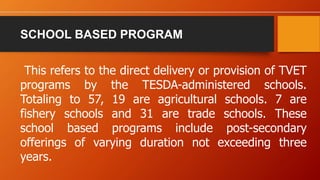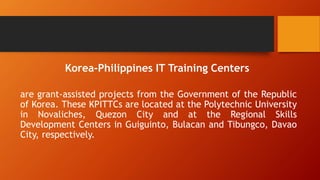Tesda
- 1. TESDA Technical Education and Skills Development Authority
- 2. • established through the enactment of Republic Act No. 7796 otherwise known as the "Technical Education and Skills Development Act of 1994“ • signed into law by President Fidel V. Ramos (August 25, 1994) • This Act aims to encourage the full participation of and mobilize the industry, labor, local government units and technical-vocational institutions in the skills development of the country's human resources.
- 3. TESDA
- 4. • It was meant to reduce overlapping in skills development activities initiated by various public and private sector agencies • to provide national directions for the country's technical- vocational education and training (TVET) system
- 5. TESDA is mandated to: • Integrate, coordinate and monitor skills development programs; • Restructure efforts to promote and develop middle-level manpower; • Approve skills standards and tests; • Develop an accreditation system for institutions involved in middle- level manpower development; • Fund programs and projects for technical education and skills development; and • Assist trainers training programs.
- 6. TESDA is expected to: • Devolve training functions to local governments; • Reform the apprenticeship program; •Involve industry/employers in skills training; •Formulate a skills development plan; •Develop and administer training incentives; •Organize skills competitions; and •Manage skills development funds.
- 7. Vision The transformational leader in the technical education and skills development of the Filipino workforce. Mission TESDA sets direction, promulgates relevant standards, and implements programs geared towards a quality-assured and inclusive technical education and skills development and certification system.
- 8. Values Statement We believe in demonstrated competence, institutional integrity, personal commitment, culture of innovativeness and a deep sense of nationalism.
- 9. Quality Policy "We measure our worth by the satisfaction of the customers we serve" Through: Strategic Decisions Effectiveness Responsiveness Value Adding Integrity Citizen focus Efficiency
- 11. Pro-active Job Matching Process TESDA shall SEEK (jobs) through domestic and international market intelligence report to pinpoint specific job requirements. TESDA shall FIND (people) the right people who can be trained to fit the jobs in partnership with NGOs, social welfare agencies / institutions, school and community organizations. TESDA shal TRAIN (people) using standards of quality for TVET developed in consultation with various industry sectors
- 12. Direction Setting • Programs and services relating to these concern embody the role of TESDA as the authority in technical vocational education and training (TVET). • These are aimed at providing clear directions and priorities for TVET in the country. These include the formulation of plans and policies for the TVET sector and the generation through researches and studies and the dissemination of relevant data and information for informed decision of stakeholders of the sector. Policies, Plans and Information
- 13. • National Technical Education Skills Development (TESD) Plan • National Technical Education Skills Development (TESD) Research Agenda • Philippine Technical Vocational Education and Training (TVET) System • Philippine Technical Vocational Education and Training (TVET) Outlook • Labor Market Intelligence Reports • List of Technical Vocational Education and Training (TVET) Studies • Technical Vocational Education and Training (TVET) Statistics
- 14. TVET Provision •school-based, •center-based, •enterprise-based and •community-based Four TrainingModalities
- 15. SCHOOL BASED PROGRAM This refers to the direct delivery or provision of TVET programs by the TESDA-administered schools. Totaling to 57, 19 are agricultural schools. 7 are fishery schools and 31 are trade schools. These school based programs include post-secondary offerings of varying duration not exceeding three years.
- 16. CENTER BASED PROGRAMS • These refer to training provisions being undertaken in the TESDA Regional (15) and Provincial (45) Training Centers totaling 60 in selected trade areas in the different regions and provinces in the country. • List of TESDA Regional and Provincial Training Centers • Training Calendar
- 17. Specialized Training Centers TESDA Women’s Center (TWC) seeks to advance the economic status of women through training, entrepreneurship development, gender sensitive policies, programs and projects and research and advocacy. It was established through a grant from the Government of Japan.
- 18. Language Skills Institute (LSI ) serves as TESDA’s facility for language programs specifically for workers intending to work abroad. The LSI conducts training on workplacecommunication on the language of the country of the worker’s destination. There are 35 LSI nationwide offering different language courses which include English, Korean, Mandarin, Japanese and Spanish.
- 19. Korea-Philippines IT Training Centers are grant-assisted projects from the Government of the Republic of Korea. These KPITTCs are located at the Polytechnic University in Novaliches, Quezon City and at the Regional Skills Development Centers in Guiguinto, Bulacan and Tibungco, Davao City, respectively.
- 20. TESDA Training Center Taguig Campus Enterprise (TTCTCE) The TTCTCE conducts and advanced technology training programs These programs generate income to support TESDA Development Fund (TDF). The TESDA board approves the training fees. From the training fees, at an agreed sharing scheme contained in a MOA, the industry partners assume all the training expenses, repair and maintain the training facilities of the center. They also bring the equipment to augment TESDA's delivery system.
- 21. COMMUNITY BASED PROGRAMS • It is primarily addressed to the poor and marginal groups, those who cannot access, or are not accessible by formal training provisions. • They have low skills, limited management abilities, and have few economic options. • They have no access to capital – most of them are unqualified for formal credit programs. The program goes further than just mere skills training provision
- 22. ENTERPRISE BASED PROGRAMS •Enterprised-Based Programs are training program being implemented within companies/firms.
- 23. Apprenticeship Program •It aims to provide a mechanism that will ensure availability of qualified skilled workers based on industry requirements. The period of apprenticeship covers a minimum of four months and a maximum of six months. Only companies with approved and registered apprenticeship programs under TESDA can be hire apprentices.
- 24. Learnership Program •a practical training on-the-job for approved learnable occupations, for a period not exceeding three months. Only companies with TESDA approved and registered learnership programs can hire learners.
- 25. Dual Training System •is an instructional mode of delivery for technology-based education and training in which learning takes place alternately in two venues: the school or training center and the company.
- 26. • Target Beneficiaries: • Trainees/ Students • Companies • Schools • Training Centers • Training Institutions • IBs/Industry Associations • LGUs • NGOs • GOs • Parents • Teachers • Trainers
- 27. Benefits of the Dual Training System • FOR STUDENTS: • Quality training and proper skills, work attitude and knowledge • Enhanced employability after training • Better chances for career mobility • Allowance for transportation and other expenses. • FOR COMPANIES: • Workers developed according to the company's needs • Guaranteed highly skilled and productive workers • Savings on production cost through tax incentives • FOR SCHOOLS: • Less need for sophisticated equipment and facilities • Responsiveness to industries' needs • Maximized use of equipment and facilities • Better employment opportunities for its graduates • Enhanced public image • Tax exemption for imported equipment
- 28. COMPETENCY STANDARDS DEVELOPMENT TESDA develops competency standards for middle-level skilled workers. These are in the form of units of competency containing descriptors for acceptable work performance. The competency standards and qualifications, together with training standards and assessment arrangements comprise the national training regulations (TR) promulgated by the TESDA Board.
- 29. • List of Promulgated Training Regulations (TR) • Training Regulations Qualification Code • Validation of the Training Regulations (TR)
- 30. ASSESSMENT AND CERTIFICATION • The assessment process seeks to determine whether the graduate or worker can perform to the standards expected in the workplace based on the defined competency standards. • Certification is provided to those who meets the competency standards. This ensures the productivity, quality and global competitiveness of the middle-level workers.
Editor's Notes
- It is about the engagement of Filipino workforce into our society
- The Merging of The fusion of the above offices was one of the key recommendations of the 1991 Report of the Congressional Commission on Education, which undertook a national review of the state of Philippine education and manpower development
- Hence, a major thrust of TESDA is the formulation of a comprehensive development plan for middle-level manpower based on the National Technical Education and Skills Development Plan.
- Developing skills of middle level Filipino man power
- Overall, TESDA formulates manpower and skills plans, sets appropriate skills standards and tests, coordinates and monitors manpower policies and programs, and provides policy directions and guidelines for resource allocation for the TVET institutions in both the private and public sectors.
- So since it is tesda, we all know that … This pro-active matching process contributes to the best job-skills fit. TESDA also focuses on increasing productivity of implemented training programs by assisting individuals or groups who prefer to go into micro business, small and medium enterprises of enterprenuership training.
- Function, Delivery of Programs and Services Program and sevices embodied … Through that
- In view to the need to provide equitable access and provision of TESD programs to the growing TVET clients, TESDA continues to undertake direct training provision.
- TESDA Technology Institutions are composed of 125 schools, regional, provincial and specialized training centers nationwide which undertake direct training activities for TESDA.
- Among TESDA’s specialized training centers are the following:
- IT hopes to become the premier information and communication technology training center in the Asia-Pacific region by producing competent IT practitioners to service the local and global manpower needs. KPITTC Quezon City will also provide training on computer graphics and animation.
- It is purposively designed to catalyzed the creation of livelihood enterprises that shall be implemented by the trainees, immediately after the training Not only that but also to assist partner agencies such as LGUs, NGOs, people organizations and other agencies organizations with mission to help the poor get into productive undertakings to help themselves and their communities.
- These programs can be any of the following: Apprentice prog is a training and employment program involving a contract between an apprentice and an employer on an approved apprenticeable occupation
- These are packaged into qualifications corresponding to critical jobs and occupations in the priority industry sectors. The qualifications correspond to a specific levels in the Philippine TVET Qualifications Framework
































